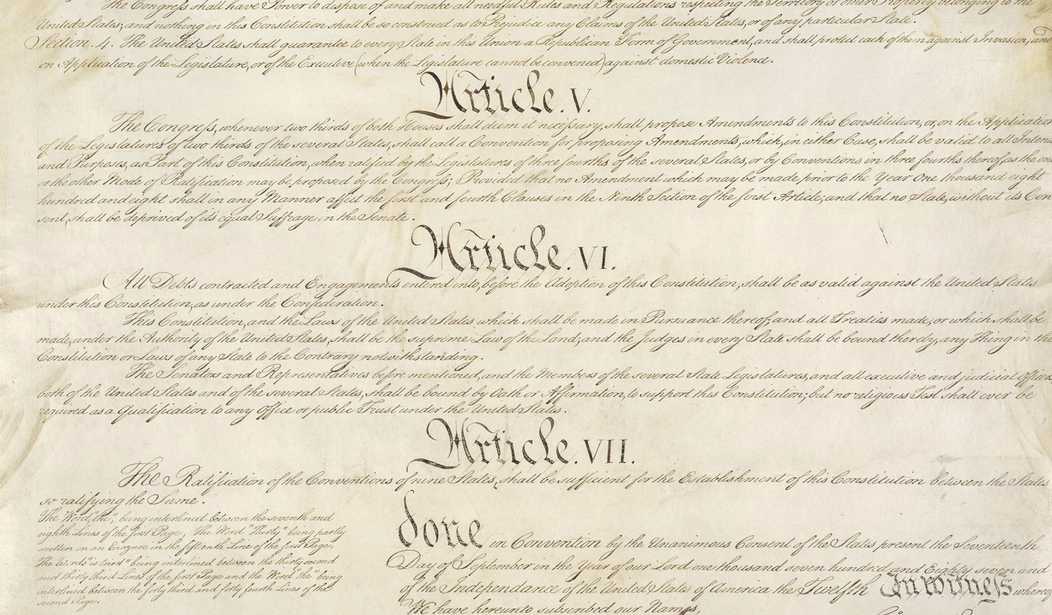We now have a president of the United States, Donald Trump, who says he is committed to streamlining the federal government. He is setting up an investigatory arm of the administration, the Department of Government Efficiency (DOGE), to identify and recommend the removal of wasteful government programs, departments, and personnel.
There is a case to be made for going much further to return the federal government to what the Founders intended, to pare it once more back to its proper constitutional boundaries. This will go beyond trimming the fat; it will involve cutting the imperial colossus our federal government has become down to the bone and then paring away some of the bone to boot.
In this fifth installment, let's talk about K-12 education.
One can sum up the single most important change we need to make in American education in two words: Competition and choice. The performance of our public schools is spotty at best. Some public schools are quite good, while others, especially in our major cities, are awful. The stock response by the education establishment seems to consistently involve demands for more funds, but there is no demonstrated correlation between spending and education quality; for example, the Washington D.C. schools receive some of the most generous funding in the nation, and they are among the worst when it comes to producing literate, productive graduates.
To reform the current education system:
Remove the federal government from education altogether. Eliminate the federal Department of Education (ED) completely, close the doors, RIF the bureaucrats. President Trump has indicated that he is willing to shut down federal agencies that have outlived their usefulness, and the ED is not only not helping educate our kids, but it has no constitutional justification for its existence. (In that respect, add it to a long list.) In our current system, public schools are managed primarily by municipal and county governments. That's a better system; all the federal government seems to be able to do is add a layer of bureaucracy and waste more tax dollars.
Eliminate any curriculum that is not narrowly focused on giving kids the skills and experiences they need to be productive adults. Gender theory, DEI, and all of these kinds of horse squeeze programs need to go - as long as schools are publicly funded. More on this in a bit.
See Related: Equity vs. Excellence: How Modern Education Policies Are Failing Students
The issue of educational standards frequently comes up when discussing federal involvement. The main answer to this is simple: It's not working. The federal Department of Education sets standards, the states set standards, and our kids aren't learning. It's time to try something else.
Establish a voucher system at the various state levels. Parents would have the choice to use the voucher to send their children to a traditional public school or to one of the myriad non-traditional private schools that would follow as surely as flowers follow rain.
Another issue that frequently crops up here: In a voucher system, should parents be allowed to use their voucher to send their children to a religious school? Yes, with qualifications: There is no First Amendment issue involved if the voucher system treats all religious institutions equally. A Christian school, a secular private school, and a Buddhist school should all receive equal consideration. However, there would inevitably be exceptions; for example, an Islamic madrassa that promotes violence should not only be ineligible, it should be shut down. Ideally, remove the government from education entirely. Eliminate the taxes that support public schools (mostly property taxes) and place responsibility for education back where it ultimately belongs, with the parents.
Will some parents neglect their responsibilities? Probably. Will there be consequences for their bad decisions? Yes. Is it the responsibility of productive members of society to shield them from the consequences of their bad decisions? No. Let their kids flip burgers.
Renew emphasis on the trades. We need to move away from the "every child should go to college" paradigm. Every child does not and should not go to college. Every nation needs carpenters, mechanics, welders, pipefitters, and other skilled trades. The trades are honorable professions that can earn the skilled tradesman a very good living. Start with middle school and high school shop classes and proceed from there.
Reform the teacher's unions. At all levels, the education unions are concerned with only one goal: To increase pay and benefits for their members and reduce their accountability to their employers - the taxpayers. This is a small part of a larger issue, in fact. Public sector unions are problematic at best. They negotiate their contracts with the very politicians whose campaigns they support, a fundamental conflict of interest on both sides, the result of which is that the public sector employees are not accountable to their actual employers - the taxpayers. Ideally, public sector employees should be ineligible for collective bargaining. The end goal should be the elimination, not only of teacher's unions but of all public-sector unions.
See Related: Amid Teacher Strike Trend, the Least OR Lawmakers Can Do Is Bring Union Negotiations Out of the Dark
A recent report from the Census Department revealed that:
Average U.S. public school spending per pupil in elementary and secondary schools rose 8.9% to $15,633 in fiscal year (FY) 2022 from the previous year, according to the U.S. Census Bureau’s most recent Annual Survey of School System Finances data.
What are we getting for our money? Have educational standards improved? Are high school graduates more literate, more informed, and more capable of critical thinking than they were a generation ago? (Note: "Critical Thinking" as taught in the schools today all too often translates to "you'll think what I damn well tell you to think.") Are students better prepared for higher education or the workforce than they were a generation ago?
You need only read any internet message board frequented by the younger generation to see the answer to that. We have produced a generation or two of marginally literate kids, and it shows.
Read: Part I, Part II, Part III, Part IV
To the President and the DOGE, I can only say that the more we divorce government from education, the better off we’ll all be.














